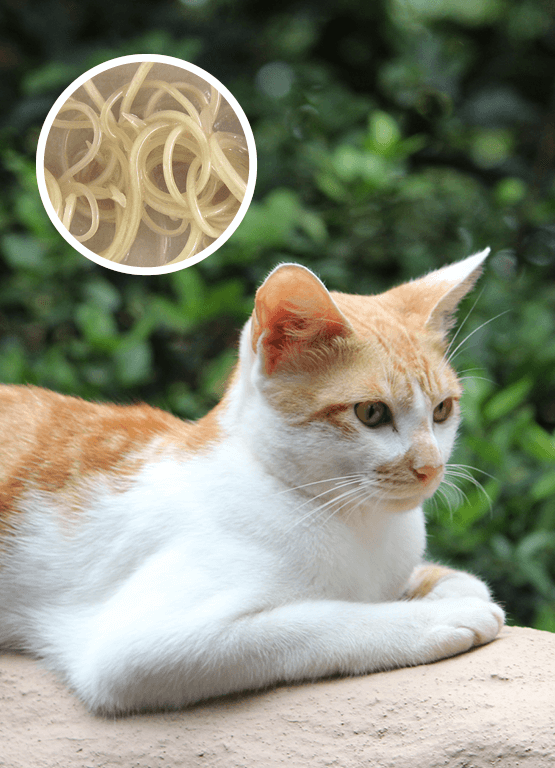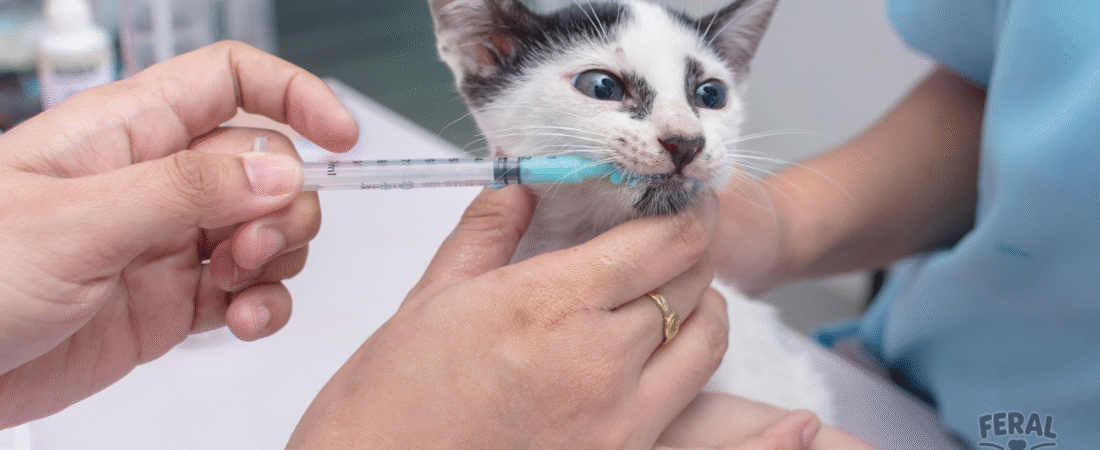Roundworms are the most common intestinal parasite in cats and dogs—especially in puppies and kittens. These spaghetti‑like worms live in the intestines, stealing nutrients, weakening the immune system, and in severe cases, causing life‑threatening illness.
They’re widespread, easy to miss at first, and can even be passed on to humans. The good news? With veterinary care, holistic remedies, and smart home practices, roundworms can be safely prevented and managed.
This article covers everything: what roundworms are, how pets get them, symptoms, treatments, holistic solutions, and natural ingredients from your very own kitchen that help keep your fur babies healthy.
📌 What Are Roundworms?
- Species:
- Toxocara canis (dogs)
- Toxocara cati (cats)
- Appearance: Long, white, spaghetti‑like worms that can reach several inches in length.
- Life cycle: Eggs are shed in feces → develop in soil → swallowed by another host → hatch inside intestines. Some larvae migrate through organs (liver, lungs) before returning to the gut to mature.
- Longevity: Eggs are extremely hardy—surviving for years in soil, sandboxes, and the environment.
Roundworms are so common that most puppies and kittens are born already infected from their mothers.

🦠 How Pets Get Roundworms
- From their mother: Infection passes across the placenta (in dogs) or through mother’s milk (in both cats and dogs).
- Ingesting contaminated soil or feces: Eggs stick to paws, fur, toys, or grass.
- Hunting prey: Mice, birds, cockroaches, and earthworms can carry larval stages.
- Grooming each other: Eggs can cling to fur and be swallowed during grooming.
Humans can also catch roundworms (zoonotic risk), especially children playing in contaminated soil.
🚨 Symptoms of Roundworm Infection
| Symptom | Why It Happens |
|---|---|
| Pot‑belly appearance (especially in kittens/puppies) | Worms take up space in belly and steal nutrients. |
| Vomiting worms | Adult worms crawl into stomach and are expelled. |
| Diarrhea or loose stool | Intestinal irritation. |
| Dull coat & poor growth | Nutrient theft leads to malnourishment. |
| Weight loss despite appetite | Worms compete for calories. |
| Coughing (young pets) | Larvae migrating through lungs. |
| Lethargy & pale gums | Anemia when infestation is severe. |
⚠️ Some infected adult cats and dogs may show no obvious symptoms but continue to shed infective eggs into the environment.
🔍 Diagnosis
- Fecal flotation (microscope): Detects thick‑shelled roundworm eggs.
- PCR/DNA test: Sensitive, used if eggs are scarce.
- Visual evidence: Worms seen in stool, vomit, or around anus.
- Multiple tests may be needed since eggs aren’t always consistently shed.
💊 Veterinary Treatment
Roundworms are highly treatable with safe medications prescribed by your vet.
- Pyrantel pamoate: Paralyzes adult worms; very safe for puppies and kittens.
- Fenbendazole: Broader spectrum, used for mixed parasite infections.
- Praziquantel + others (in combo meds): Tackle tapeworms plus roundworms.
- Monthly preventatives (like Interceptor®, Revolution®, Advantage Multi®): Protect against roundworms while also guarding against fleas, ticks, or heartworms.
- Re-dosing: Essential every 2 weeks until at least 12 weeks old, since larvae mature at different times.
⚠️ Do not use human wormers on pets. They’re often toxic or dangerously dosed for cats and dogs.
🌿 Holistic & Natural Approaches
Natural methods cannot replace veterinary dewormers for a heavy infection, but they are excellent for:
- Strengthening digestion
- Reducing reinfection risk
- Complementing medical treatment
Here are safe, kitchen‑ready ingredients:
🥜 1. Pumpkin Seeds
- Contain cucurbitacin, which paralyzes worms.
- How to use: Grind raw, unsalted seeds and add to meals.
- Dogs: 1 tsp per 10 lbs daily.
- Cats: ½ tsp daily mixed with wet food.
🥕 2. Carrots
- High in rough fiber, “sweeps” mucus and debris from the gut, discouraging parasites from latching on.
- How to use: Add finely grated carrot (1 tbsp dogs, a small pinch for cats) to food.
🥥 3. Coconut (Oil or Flakes)
- Rich in lauric acid, which has antiparasitic and antibacterial properties.
- How to use:
- Coconut oil: ¼ tsp per 10 lbs, added to meals.
- Unsweetened flakes: Sprinkle a tsp in food several times per week.
🍎 4. Apple Cider Vinegar (ACV)
- Helps make the gut environment less appealing to parasites.
- How to use: A few drops in water or food (max: ½ tsp cats, 1 tsp small dogs, 1 tbsp large dogs).
🌿 5. Parsley Tea (Detox Support)
- Mild cleansing effect, helps flush toxins post-deworming.
- How to use: Steep parsley in hot water, cool, and add 1–2 tsp to food for 2–3 days.
🥒 6. Zucchini or Cucumber
- Hydrating, fiber-rich veggies to encourage bowel regularity and gut cleansing.
🧉 7. Probiotics (Kefir or Yogurt)
- Balance gut microbiome, making intestines less worm-friendly.
- Use plain, unsweetened, small amounts (safe for dogs; cats only in moderation).
🏡 Home & Environmental Care
Even with treatment and holistic support, pets can get reinfected unless their environment is cleaned.
- Daily scooping: Pick up stools within 24 hours to stop eggs from becoming infective.
- Sanitize litter boxes: Use gloves, hot water, and soap regularly.
- Wash bedding & toys weekly: Hot water kills parasite eggs.
- Vacuum & mop floors: Roundworm eggs are sticky and can cling to shoes, rugs, and carpets.
- Cover sandboxes: Prevent stray cats from contaminating play areas.
- Practice flea control: Prevents tapeworms and lowers worm risk overall.
🛡️ Prevention
- Deworming schedule:
- Puppies/kittens: Every 2 weeks until 12 weeks, then monthly until 6 months.
- Adults: Every 3–6 months, or monthly preventatives.
- Pregnant and nursing pets: Deworm as advised by vet to reduce infection to puppies/kittens.
- Hygiene: Wash hands, especially kids playing in soil; wear gloves when gardening.
- Regular vet visits: Annual or bi-annual fecal checks catch parasites early.
🌱 Quality of Life
- With prompt treatment, pets recover fully.
- Puppies and kittens thrive when dewormed correctly, regaining energy and excellent growth.
- Holistic supports (pumpkin seeds, veggies, probiotics) + clean environment help maintain wellness and lower reinfection risk.
Long-term parasite prevention equals a healthier, shinier coat, proper weight gain, stronger immune defenses, and peace of mind for families.
❓ FAQs
1. Can I just use pumpkin seeds instead of deworming meds?
No. Pumpkin seeds help, but only medical dewormers can ensure full clearance of roundworms.
2. Can my indoor cat get roundworms?
Yes. Eggs can come indoors on shoes, pests, or fleas.
3. Are roundworms dangerous to humans?
Yes. Children are at risk—swallowing eggs can lead to “visceral larva migrans” or even vision problems.
4. How do I stop roundworms from coming back?
Keep pets on monthly preventatives, clean up stool daily, and use natural supports like pumpkin seeds and coconut oil to strengthen gut health.
5. Is it safe to use herbs like wormwood or clove oil?
Not without a holistic vet! They may be safe for dogs in controlled doses but are toxic to cats. Stick with proven kitchen remedies.
💡 Final Thoughts
Roundworms affect millions of dogs and cats worldwide, but they don’t have to harm your pet. With vet-approved dewormers, holistic supports from your kitchen, and simple hygiene, you can break the roundworm life cycle and protect both your pets and family.
✅ Key takeaway: Combine conventional vet treatment with natural daily supports (pumpkin seeds, carrots, coconut, ACV, parsley) and home hygiene for lifelong parasite protection.

